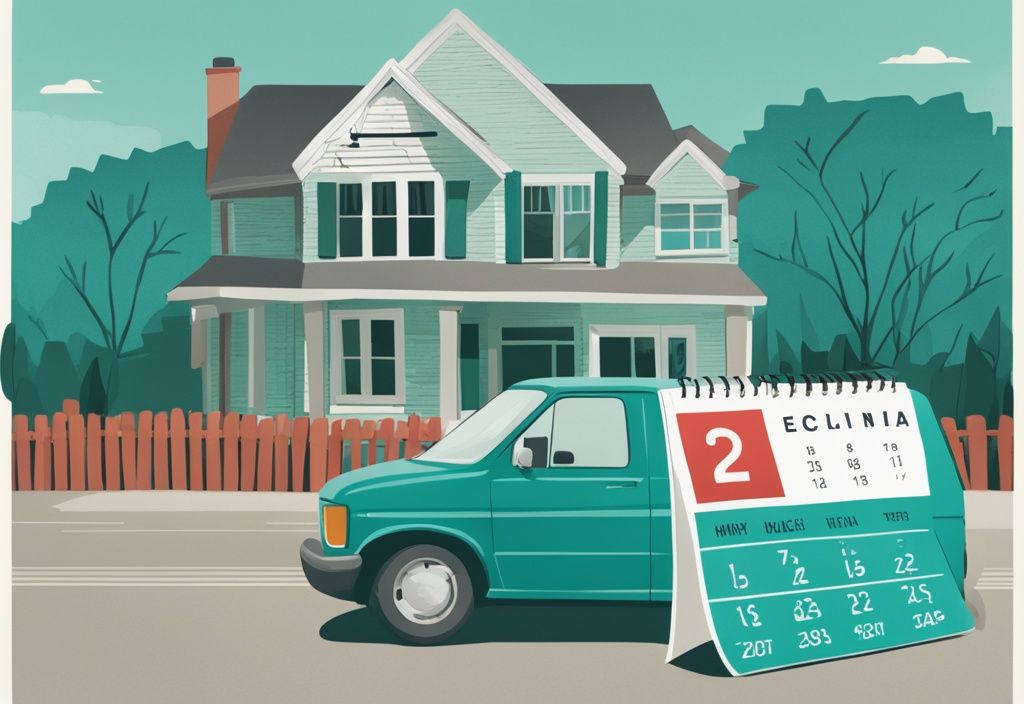Understanding Eviction: How Long Does an Eviction Take? Get Informed
Ever wondered, “How long does an eviction take?” Well, you’re not alone. As a seasoned home security expert, I’ve seen how eviction can send ripples of uncertainty both for landlords and tenants. The timeline is crucial; it’s like a ticking clock, counting down to a significant change.
In this article, we’ll dive into the eviction process, from the first notice to the final removal. We’ll highlight the key factors that can stretch or shrink that timeline, just like how a burglary could be thwarted by a well-placed security camera or a sturdy lock.
Whether you’re a landlord or tenant, understanding these timelines can help you navigate this challenging period. It’s like having a security plan – you’re better off knowing what’s coming. So, let’s get started, shall we?
Understanding the Eviction Timeline
The eviction process can be a daunting experience for both landlords and tenants. Knowing the steps involved and the time each stage takes can help manage expectations and reduce stress. Let’s break down the eviction timeline, from the initial notice to the final court ruling.
Initial Steps: Notice to Quit
The eviction process kicks off with the landlord issuing a written notice to the tenant. This notice period varies widely, ranging from 3 to 30 days, depending on state laws and the reason for eviction. Notices typically fall into three categories: “Pay Rent or Quit,” “Cure or Quit,” and “Unconditional Quit.” To ensure proof of delivery, landlords should send these notices via certified mail. For example, in Maryland, a “Notice to Vacate” requires one month’s advance written notice, or just 14 days if there’s an imminent danger.
State-Specific Notice Periods
Notice periods differ by state. In California and Arkansas, landlords must wait 3 days for non-payment of rent before filing for eviction. Other states may require a longer wait, sometimes 10 days or more. Generally, landlords must wait several days after serving an eviction notice before they can start the formal eviction process.
Filing an Eviction Lawsuit
If the tenant doesn’t comply with the notice, the landlord’s next step is to file an eviction lawsuit, also known as an unlawful detainer lawsuit. This involves filing a Magistrate’s Summons and a Complaint in Summary Ejectment with the Clerk of Court. The landlord must then serve the tenant with these documents, which can be done through the Sheriff’s Office, a process server, or by registered/certified mail.
Summons and Complaint
Once the lawsuit is filed, the court schedules a hearing date and issues a summons for the tenant to appear. If the tenant fails to show up in court, the landlord may win the case by default judgment. In small claims court, the hearing usually takes place within 10 days of filing the summons and complaint. Tenants can request a continuance, or postponement of the court date, of up to 5 days with the landlord’s agreement.
Court Proceedings and Timeline
Hearing Date and Summons
During the court hearing, both the landlord and the tenant present their cases. The judge then issues a ruling based on the evidence. The length of these court proceedings can vary, taking anywhere from a few weeks to several months, depending on the jurisdiction and whether the tenant contests the eviction.
Judge’s Ruling
If the judge rules in favor of the landlord, the tenant is typically given a few days to vacate. Either party has the option to appeal the court’s decision, which can further extend the eviction timeline. Generally, court proceedings allow tenants one to four weeks to move out after the ruling. Additional delays can occur if the tenant files motions for more time, declares bankruptcy, or appeals the ruling.

Factors Influencing the Eviction Timeline
State and Local Laws
State and local landlord-tenant laws play a crucial role in determining how long an eviction takes. Each state has its own set of regulations that dictate the eviction process, including notice periods, filing procedures, and court requirements. For instance, some states may mandate longer notice periods before a landlord can file for eviction, while others may offer expedited processes for certain types of evictions.
Additionally, many states have programs designed to assist tenants facing eviction, such as free legal aid or emergency rental assistance. These programs can extend the eviction timeline as they provide tenants with the means to contest the eviction or pay overdue rent, thereby delaying the process.
Court Schedules and Backlogs
The eviction timeline is significantly affected by the schedules and backlogs of the housing courts. When courts are overwhelmed with cases, as often happens during periods of economic downturn, pandemics, or natural disasters, the time it takes for an eviction case to be heard can be extended considerably.
This backlog means that even after filing the necessary paperwork, landlords and tenants may have to wait weeks or even months for a court date. The efficiency of the court system in a given jurisdiction can therefore have a major impact on how long an eviction takes from start to finish.
Tenant’s Response and Legal Actions
The actions and responses of the tenant are another critical factor in determining how long an eviction takes. If a tenant decides to contest the eviction, claiming it is illegal or arguing that the landlord has not maintained the property in a habitable condition, the process can be delayed.
Tenants have the right to appeal decisions, request continuances, or even file for bankruptcy, all of which can extend the timeline. For instance, after a small claims court hearing, tenants can appeal for a new trial in District Court within 10 days.
Landlords can expedite the process by maintaining detailed records and correspondence, which can help disprove tenant claims swiftly. However, the tenant’s legal actions and responses often add complexity and length to the eviction timeline.
Post-Court Procedures and Duration
Obtaining a Writ of Possession
Once the court rules in favor of the landlord and the tenant refuses to vacate, the landlord must obtain a Writ of Possession. This legal document authorizes law enforcement to remove the tenant from the property. Typically, the landlord will receive the writ 11 days after the small claims court ruling, provided the tenant does not appeal or fails to pay the appeal bond. This step is crucial in ensuring that the eviction process proceeds in accordance with the law.

Timeline for Physical Eviction
The physical eviction of a tenant involves several steps and can take some time. After the landlord obtains the Writ of Possession, the Sheriff’s Office is responsible for executing the order. The sheriff will act within five days of receiving the writ, but they will provide the tenant with some advance notice before the actual eviction day. The entire process can take up to 14 days to post a notice and another 14 days for the physical removal.
On the day of eviction, law enforcement will require the tenant to vacate the property immediately. If the tenant has not moved out by the time the sheriff arrives, they will be ordered to leave, and their belongings will be padlocked inside the property. The tenant then has 5-7 days to arrange with the landlord to collect their belongings. If the tenant fails to remove their items within this timeframe, the landlord gains the legal right to dispose of them.
Understanding how long does an eviction take is essential for both landlords and tenants to navigate the eviction process effectively. The timeline may vary based on local laws, court schedules, and tenant actions, but having a clear grasp of each step can help manage expectations and plan accordingly.
Potential Delays in the Eviction Process
Evictions can be a lengthy ordeal, often fraught with unexpected delays. Let’s dive into some common reasons why the eviction timeline might stretch out longer than anticipated.
Tenant’s Legal Claims
When a tenant challenges the legality of an eviction, it can throw a wrench into the process. Imagine you’re a landlord, and your tenant argues that the eviction is illegal. They might cite procedural errors or claim their rights have been violated. Another frequent issue is the condition of the property. If the tenant believes the home isn’t habitable, they might file a complaint with local housing authorities. These claims need thorough investigation and resolution, often requiring extra court hearings and inspections. This can significantly extend how long an eviction takes. Knowing these potential hurdles can help both landlords and tenants brace for delays.
Appeals and Continuances
Appeals and continuances can also stretch out the eviction timeline. If either party isn’t happy with the court’s decision, they can file an appeal. This adds a new layer of legal proceedings, often dragging on for months. Tenants can also request a continuance, essentially asking to postpone the court date. With the landlord’s consent, this can add up to 5 more days to the process. Further delays might occur if the tenant files for more time, declares bankruptcy, or takes additional legal actions. These steps can make the eviction process longer and more complex, impacting how long an eviction takes.
Conclusion: Average Duration of an Eviction Process
The average duration of an eviction process can vary significantly, ranging from a few weeks to several months, and in some extreme cases, over a year. This duration is influenced by multiple factors, including local and state landlord-tenant laws, court schedules, and whether the tenant contests the eviction.
Local and state laws play a crucial role in determining how long an eviction takes. Each jurisdiction has specific requirements for notices, waiting periods, and court proceedings. For example, some states may mandate a longer notice period or provide tenants with more opportunities to contest the eviction, thereby prolonging the process.

Court schedules and backlogs also impact the timeline. In areas with a high volume of cases or during periods of turmoil, such as pandemics or natural disasters, the court system may experience delays, further extending the eviction process.
The complexity of the eviction can also affect its duration. Simple evictions might only involve the landlord issuing a written notice to the tenant, followed by the tenant vacating the property within the stipulated time frame. However, complex evictions may escalate into legal disputes involving lawyers, multiple court hearings, and appeals, significantly lengthening the process.
Understanding and adhering to state and local landlord-tenant laws is essential for both landlords and tenants. This knowledge helps avoid unnecessary conflicts and delays, ensuring that the eviction process proceeds as smoothly and swiftly as possible. By being well-informed, landlords can better navigate the legal requirements, while tenants can protect their rights and seek appropriate remedies if needed.
In summary, the question of how long does an eviction take depends on various factors, including legal stipulations, court efficiency, and the specifics of the eviction case. Both parties should prepare and act in accordance with the law to minimize delays and ensure a fair resolution.
FAQ
What is the average duration of an eviction process?
– The duration of an eviction can range from a few weeks to a few months, and in some cases, over a year. Factors such as state laws, court schedules, and tenant actions can influence how long an eviction takes.
Can a tenant delay the eviction process?
– Yes, tenants can delay the eviction process by contesting the eviction, filing appeals, or claiming the landlord is not maintaining the property in a habitable condition. These actions can significantly extend how long an eviction takes.
What happens if a tenant does not appear in court?
– If the tenant does not appear in court, the landlord may win by default judgment. This can expedite how long an eviction takes, as the court will likely rule in favor of the landlord.
How long does a landlord have to wait after serving a Notice to Quit?
– In most states, a landlord must wait several days after serving an eviction notice before starting the eviction process. The waiting period can range from 3 to 30 days, depending on the state and the reason for eviction.
How can a landlord expedite the eviction process?
– Detailed records and correspondence can help a landlord disprove tenant claims and expedite the eviction process. Seeking legal advice from a qualified landlord-tenant attorney is recommended for anyone facing eviction. Understanding and adhering to state and local landlord-tenant laws can help avoid unnecessary delays.
I’m James Albright, a home security expert with over 15 years of experience, and I’m passionate about helping families protect what matters most. After serving as a police officer, I transitioned to security consulting to share my hands-on knowledge and practical tips. My mission is to make home security simple and reliable by offering clear, no-nonsense advice and easy-to-follow guides. When I’m not reviewing the latest security tech or writing, I’m out in the community leading neighborhood watch programs and, most importantly, keeping my own family safe.





Post Comment